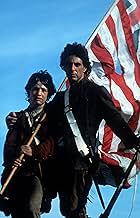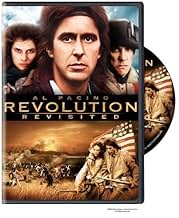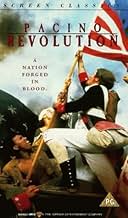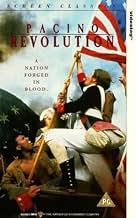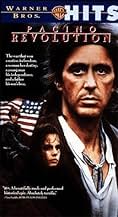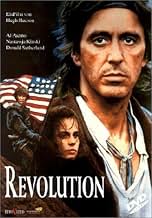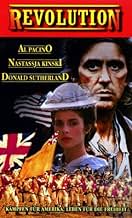IMDb-BEWERTUNG
5,3/10
7960
IHRE BEWERTUNG
Ein Fallensteller und sein kleiner Sohn werden als unwillige Teilnehmer früh in die amerikanische Revolution hineingezogen und bleiben bis zum Ende dabei.Ein Fallensteller und sein kleiner Sohn werden als unwillige Teilnehmer früh in die amerikanische Revolution hineingezogen und bleiben bis zum Ende dabei.Ein Fallensteller und sein kleiner Sohn werden als unwillige Teilnehmer früh in die amerikanische Revolution hineingezogen und bleiben bis zum Ende dabei.
- Auszeichnungen
- 1 Gewinn & 4 Nominierungen insgesamt
Cheryl Anne Miller
- Cuffy
- (as Cheryl Miller)
Empfohlene Bewertungen
After the Academy Awards, the most important awards ceremony is the Golden Raspberries (known as "Razzies") – the "worst of" counterpart to the Oscars. The thing about the Razzies is that they don't go for the literal worst movies of the year – otherwise they would give prizes to a load of trashy B-movies. Instead they bestow their honours upon the high profile flops, the movies that could have been so much more, the casts and crews who should have known better. Revolution stars Al Pacino, one of the greatest actors of his generation, and was directed by Hugh Hudson, he of 1981 Best Picture Chariots of Fire. And yet, in a stark "Oh how the mighty have fallen" scenario, it recouped less than two percent of its budget at the box office and was nominated for four Golden Raspberries.
Revolution is not without promise. In contrast to the usual gung-ho attitude of pictures on this subject (cf. The Patriot), this takes an approach rare in historical pictures on any era, showing not the makers and shapers of change, but those unwillingly caught up in it. The Robert Dillon screenplay still ultimately comes down on the side of the revolutionaries, but it shows the conflict with the minimum of political emotiveness, and a storyline whose occasional poignancy comes from its even-handed intimacy. Director Hudson has excelled in creating tableaux that are full of believable bustle and period dirt, even if they were entirely shot in rainy England. There's a realistic melange of accents to be heard here; not just clipped British and broad American, which didn't really exist in any recognisable form at the time anyway. The credibility of some of the bit parts is very effective, such as the bolshy soldier who prods Pacino when he's chosen for the fox hunt, a slappable face if ever there was one.
And yet the movie's the biggest flaws are on the same grounds. There are some woefully unrealistic and downright silly characterisations here. Chief among these is Nastassja Kinski's. While no means badly acted (in fact she does very well all things considered), the character as written is in no way believable. Not that you can't have rebellious and resourceful women, but stabbing a man in the nadgers at a soirée is a bit hard to swallow. It would probably have warranted her a stint in an asylum, and certainly more than just a telling off from her mother. And giving the Englishman in question a stupid nasal voice and cartoonish demeanour was a huge mistake. It all seems totally at odds with the realism elsewhere in the movie. There are problems too with the over-earnest attempt at a documentary look. Hudson's constant use of hand-held camera quickly becomes tiresome. Pacino's performance is heartfelt but there are times when he appears to break into improvisation yet comes across too much as the modern New Yorker.
In response to its poor reception, Hudson would later revisit the material for a 2009 special edition appropriately titled Revolution Revisited, and it is this version of the movie which I have seen. Apparently around ten minutes of footage was shorn off (I don't know what this was so can't comment), and they added narration by Pacino, written and recorded ad hoc. This latter was to my mind a mistake – it adds nothing, basically spelling out the character's thoughts at any given moment, even though the essence of them is already there on the screen. It somewhat spoils the taciturn moodiness of the character, as well as the chaotic wordlessness of some scenes. It's nice however to be able to enjoy a decent new transfer of the picture, because it really isn't as bad as its reputation (and those Razzie nominations, all of which it lost to Rambo II, I hasten to add) would suggest. It is incredibly moving at times, a high point being Pacino's desperate comforting of Ned as his foot wound is cauterized. It's also beautifully shot. This is ultimately a movie of two sides – the very good and the very bad, with no middle ground of mediocrity. And this is very frustrating, because you can see just how easily it could have been a masterpiece.
Revolution is not without promise. In contrast to the usual gung-ho attitude of pictures on this subject (cf. The Patriot), this takes an approach rare in historical pictures on any era, showing not the makers and shapers of change, but those unwillingly caught up in it. The Robert Dillon screenplay still ultimately comes down on the side of the revolutionaries, but it shows the conflict with the minimum of political emotiveness, and a storyline whose occasional poignancy comes from its even-handed intimacy. Director Hudson has excelled in creating tableaux that are full of believable bustle and period dirt, even if they were entirely shot in rainy England. There's a realistic melange of accents to be heard here; not just clipped British and broad American, which didn't really exist in any recognisable form at the time anyway. The credibility of some of the bit parts is very effective, such as the bolshy soldier who prods Pacino when he's chosen for the fox hunt, a slappable face if ever there was one.
And yet the movie's the biggest flaws are on the same grounds. There are some woefully unrealistic and downright silly characterisations here. Chief among these is Nastassja Kinski's. While no means badly acted (in fact she does very well all things considered), the character as written is in no way believable. Not that you can't have rebellious and resourceful women, but stabbing a man in the nadgers at a soirée is a bit hard to swallow. It would probably have warranted her a stint in an asylum, and certainly more than just a telling off from her mother. And giving the Englishman in question a stupid nasal voice and cartoonish demeanour was a huge mistake. It all seems totally at odds with the realism elsewhere in the movie. There are problems too with the over-earnest attempt at a documentary look. Hudson's constant use of hand-held camera quickly becomes tiresome. Pacino's performance is heartfelt but there are times when he appears to break into improvisation yet comes across too much as the modern New Yorker.
In response to its poor reception, Hudson would later revisit the material for a 2009 special edition appropriately titled Revolution Revisited, and it is this version of the movie which I have seen. Apparently around ten minutes of footage was shorn off (I don't know what this was so can't comment), and they added narration by Pacino, written and recorded ad hoc. This latter was to my mind a mistake – it adds nothing, basically spelling out the character's thoughts at any given moment, even though the essence of them is already there on the screen. It somewhat spoils the taciturn moodiness of the character, as well as the chaotic wordlessness of some scenes. It's nice however to be able to enjoy a decent new transfer of the picture, because it really isn't as bad as its reputation (and those Razzie nominations, all of which it lost to Rambo II, I hasten to add) would suggest. It is incredibly moving at times, a high point being Pacino's desperate comforting of Ned as his foot wound is cauterized. It's also beautifully shot. This is ultimately a movie of two sides – the very good and the very bad, with no middle ground of mediocrity. And this is very frustrating, because you can see just how easily it could have been a masterpiece.
I've just seen "Revolution" on TV and I have to say that it's a much better movie than one may think. Sometimes a movie is worth-seeing only because of its wonderful production values. And "Revolution" is an eye-popping visual feat: wonderful cinematography, first-rate period details. I might say that beside Stanley Kubrick's "Barry Lyndon" and Tony Richardson's "Tom Jones", this is the most beautifully made period movie about the eighteenth century. "Revolution" is also an important film because there are only about a dozen films on the Revolutionary War and almost all of them are a matter of obscurity - at least for a Hungarian movie lover. The most popular is Roland Emmerich's "The Patriot" (2000). In my opinion that's a much worse film than Hudson's maligned film. When "Revolution" was released it was a critical and commercial disaster. I think it didn't fit in any of the movie trends of the 1980s. But in the future it might be regarded as a flawed but valuable movie. Its flaws are obvious and much-discussed so I don't want to speak about them. If you're interested in beautiful period pieces and the Revolutionary War you might like this movie.
Searching for some short-length used videotapes, I found the laserdisc version of "Revolution," which I'd never seen. This non-letterbox, TV format version had the usual "talking to air" problem with 2.35:1 movies. Although a scratch and miscellaneous dirt made the picture skip/repeat/wobble, it was an interesting foxhole-level look at the American Revolution. The scenery, set design, costumes, and varied kinds of people made me think that this was Sergio Leone's take on The War for Independence. Was Al Pacino believable as a backwoods English colonist? No, but like a scratch running through a film, the "speech impediment" is overlooked as the tale unfolds. This film, unlike "The Patriot," shows camp followers, Indians on both sides, fighting women, "Not Worth a Continental" issues, lots of dirt and the conventions and results of 18th century warfare. Valley Forge isn't as grim an encampment as paintings and written records reported, but it's a close miss for the English countryside location. Are the characters believable? Hard to tell, since their histories and motives aren't complete. (Having the action jump place to place with jumps in time make this a "fill-in-the-missing-backstory" exercise found in James Clavell's book "Nobel House" series.) Is it an interesting movie? Definitely, and has that 18th century "fleas, dirt, and grease" look that is missing from "The Patriot." 7/10, for presenting issues and motives that turned English colonists into Americans.
I had wanted to see this movie for quite some time, but for some strange reason it never appeared on television despite its cast. However, I finally managed to find a copy of it at a specialized video store in my city. (The version I found was the director's cut.) So what did I think of it? Well, I admit that the look of the movie is very convincing. The costumes, props, and set decoration look fantastic. It really seems that they captured what the colonies were like more than 200 years ago.
However, the story and characters are less convincing. For example, the movie seems to suggest that most Americans were pro-revolution. In actual fact, a third were pro-revolution, another third were British loyalists, and the remaining third either didn't care or were undecided. Another odd fact is that the movie portrays just about all of the pro- revolutionists as despicable - odd because the filmmakers were trying to sell this movie to the American public! Actually, most of the other characters in the movie, like the British soldiers, are also shown in a negative light. There are precious few characters in the movie to care about. The actors try, but a lot of the roles are shallow. Donald Sutherland and Nastassja Kinski have little to do despite their billing.
There are other problems in the movie I could go on for some time listing, like Pacino's extensive yet completely unnecessary narration. Still, I will admit that while I didn't like the movie, I wasn't bored at any moment. There's plenty of eye candy, and I confess a curiosity as to how Pacino's character would end up. The movie isn't as bad as some critics have claimed... though I won't hesitate to add that it wasn't worth the years I searched for a way to see it.
However, the story and characters are less convincing. For example, the movie seems to suggest that most Americans were pro-revolution. In actual fact, a third were pro-revolution, another third were British loyalists, and the remaining third either didn't care or were undecided. Another odd fact is that the movie portrays just about all of the pro- revolutionists as despicable - odd because the filmmakers were trying to sell this movie to the American public! Actually, most of the other characters in the movie, like the British soldiers, are also shown in a negative light. There are precious few characters in the movie to care about. The actors try, but a lot of the roles are shallow. Donald Sutherland and Nastassja Kinski have little to do despite their billing.
There are other problems in the movie I could go on for some time listing, like Pacino's extensive yet completely unnecessary narration. Still, I will admit that while I didn't like the movie, I wasn't bored at any moment. There's plenty of eye candy, and I confess a curiosity as to how Pacino's character would end up. The movie isn't as bad as some critics have claimed... though I won't hesitate to add that it wasn't worth the years I searched for a way to see it.
As a high school US History teacher I often use a few scenes from this film in my classes. I have found value in some elements of this dark, brooding, and sluggish film and think it deserves some credit. Examples are: NY City in the opening and closing scenes, (they are our history books brought to life). The battles of NY, specifically Long Island and Brooklyn Heights (the film is vague as to which exact battle this is) the complicated world of Nastasia Kinski's character Daisy, daughter of loyalists, mother yes, but which side is her father really on? Additionally, the miserable conditions at Valley Forge, and very importantly, Tom and Ned "quitting" the war after their first battle (Historically Washington's "grand army" melted away by the autumn of 1776). As a teacher I love the resource of this film. As a parent I want my children to be exposed, As a period movie fan I don't love this film very much.
Wusstest du schon
- WissenswertesWhen Annie Lennox's character sings a song near the end of the movie, her voice is dubbed.
- PatzerIn battle, the British soldiers are depicted taking short steps; in reality, Redcoats were trained to take long paces, so as to close the range quickly.
- Alternative VersionenIn 2009, Hugh Hudson made his own director's cut titled "Revolution Revisited" which was also released on DVD. The new version featured new narration recorded by Al Pacino, a different ending, and removed 10 minutes of footage from the film.
- VerbindungenEdited into Give Me Your Answer True (1987)
Top-Auswahl
Melde dich zum Bewerten an und greife auf die Watchlist für personalisierte Empfehlungen zu.
- How long is Revolution?Powered by Alexa
Details
- Erscheinungsdatum
- Herkunftsländer
- Sprache
- Auch bekannt als
- Revolution 1776
- Drehorte
- King's Lynn, Norfolk, England, Vereinigtes Königreich(New York scenes)
- Produktionsfirmen
- Weitere beteiligte Unternehmen bei IMDbPro anzeigen
Box Office
- Budget
- 28.000.000 $ (geschätzt)
- Bruttoertrag in den USA und Kanada
- 358.574 $
- Eröffnungswochenende in den USA und in Kanada
- 52.755 $
- 29. Dez. 1985
- Weltweiter Bruttoertrag
- 358.574 $
- Laufzeit
- 2 Std. 6 Min.(126 min)
- Farbe
- Seitenverhältnis
- 2.35 : 1
Zu dieser Seite beitragen
Bearbeitung vorschlagen oder fehlenden Inhalt hinzufügen


